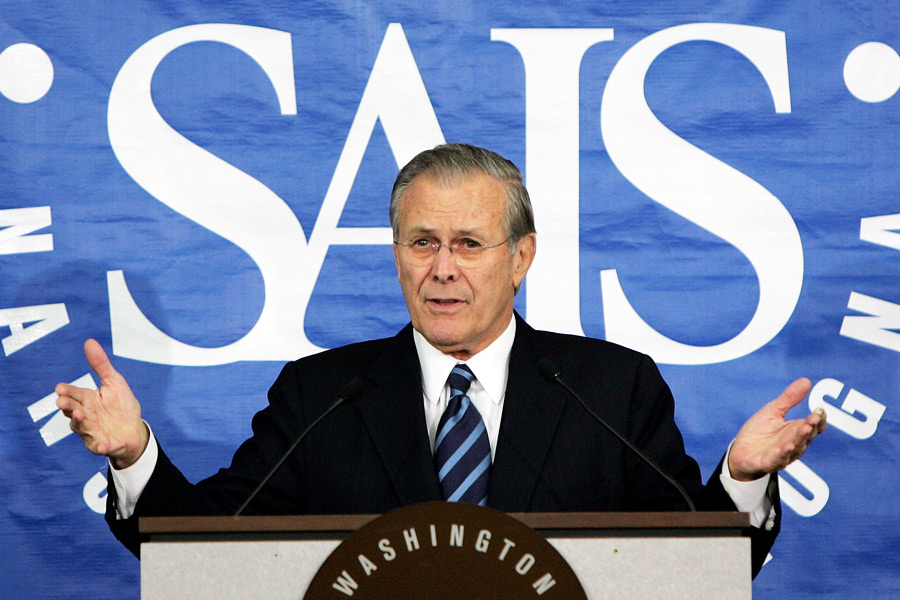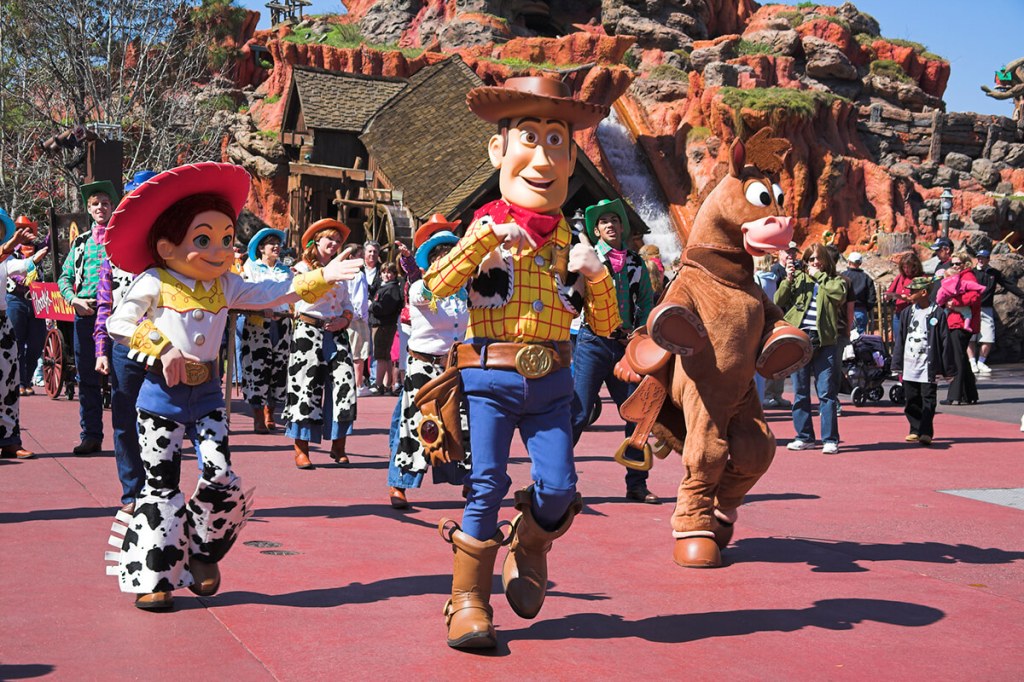Rumsfeld Talks: Defending the Iraq Invasion Before the Sunni Insurrection

I went to hear former Secretary of Defense Donald Rumsfeld speak at the Harvard Club in Manhattan last Monday night. There were people outside picketing the fact that he was in there. The blood of 5,000 dead Americans was on his hands, they said. Don’t go in. Certainly don’t support him by buying his book.
My wife had refused to come to hear him speak. She hates Rumsfeld. I went with my best friend, Mischa, who is a Republican and whose views are very different from mine. We often talk calmly about these differences. We got to the club early, so we got to sit in the third row.
Rumsfeld was the Secretary of Defense during the George W. Bush administration when, shortly after 9/11, Bush ordered us off to war to topple Saddam Hussein in Iraq. It was Rumsfeld and Vice President Dick Cheney who, with the President and other advisors, made the decision to invade Iraq in response to 9/11. Hussein was a vicious dictator. He had attacked and overrun Kuwait. He bragged about having poison gas. He was suspected of having nuclear weapons. He rattled his saber at America.
Earlier, in this newspaper, as the media ramped the country up for the war, I wrote four separate articles, week by week, demanding that they call off the invasion of Iraq. Saddam Hussein had not caused 9/11. Osama bin Laden did. We should have invaded Afghanistan. This was the wrong country.
But invade we did, and in short order took out the dictator. And then, as if going in there in the first place was not enough, we made the huge mistake of dismantling his military. Then we dismantled his bureaucracy. Not many American soldiers were killed in the war. But during the next seven years, 5,000 died and approximately $2 trillion was spent to set up a democratic government that, because people from the Shiite tribe were in a majority, resulted in the throwing out of the former longtime rulers who, like Hussein, were Sunnis. We were creating a mini-America there.
Rumsfeld was at the Harvard Club to promote his book Known and Unknown: A Memoir. But the crowd filled the Harvard Room to overflow its capacity, and 400 people waited to hear what he had to say about that war and what part he played in the decision-making that led to it.
“I’ll take questions now,” he said after speaking for a half-hour. “But in deference to the fact that I’m 81 now, they cannot be four-part questions. I only answer one-part questions.”
Rumsfeld said that the agreement the administration made to invade Iraq was only, he thought, to take out Saddam Hussein, and then go home. But then, after that—the invasion and victory took 42 days—there was a change.
“If you read President Bush’s speeches, you notice it. He now wanted the American military to stay in Iraq and bring democracy to Iraq. We had not signed on for this. It was my opinion that we should have gone home and let them sort it out so long as they were not a danger to others. Not every country should be an American democracy. But Bush was the President and he was taking it further.”
Truth is, at 81 and long retired, Rumsfeld was acknowledging the mistake. The post war had gone very badly. And he, a Princeton graduate, an intellectual and a conservative who had a lifelong career in government, was not dodging the issue. But he was excusing himself.
“That’s how he can sleep at night,” I whispered to Mischa.
“He did the right thing,” Mischa replied. Mischa had been an officer in the Soviet Navy when I met him in Moscow in the late 1980s. Now he’s an American, and a hawkish Republican.
“It’s tough being a president,” Rumsfeld said. “We have to make these decisions. And you do the best you can with the information you receive. But sometimes, the information you receive is faulty. Even what the military does after decisions are made can be faulty. But I have no regrets.”
He was asked if he thought all the blood and money spent had exhausted America and led to our great recession. He replied by saying he thought it had led to the “Arab Spring.”
“If we hadn’t been there,” he said, “that whole part of the world would be continuing as a series of dictatorships. You wouldn’t have the democracies such as you have in Iraq today
and elsewhere.”
That was on Monday. On Tuesday, the Sunnis, who had run the government before we took out Saddam Hussein, were now, as rebels in Iraq, on the march, having taken Mosul and on the road to capture Baghdad. Our democratically imposed elected government was now teetering.
It is interesting to remember that Iran, which has nuclear weapons and borders Iraq, is a Shiite-run country, and, before we came in and “fixed” Iraq so the Sunnis were out in the majority rules voting, fought a bloody eight-year war with Sunni Iraq that ended in stalemate after 500,000 soldiers or more died. The war went from 1980 to 1988. These two Islamic sects hate each other. Did then and do now.
I am writing this on Wednesday afternoon. Al-Maliki, the Shiite President of Iraq, has appealed to America to send in our jets to help them defend their democracy. We should fire rockets at the approaching Sunnis.
It is important to remember that both the Sunnis and Shiites are opponents of the havoc waged by radical Islamists. It was Saddam Hussein himself who said while we conducted our two-year-long fruitless search for weapons of mass destruction, that he was no friend of Radical Islam and wanted none of their type in his country. And then we hung him.
Now it turns out that this group of Sunnis marching on Baghdad are as radical and as they come. They want everybody who does not agree with them to have their throats slit. And they intend to run things by announcing a new country as a base of operations, partly in Iraq and partly in Syria. Was Bush right?
Rumsfeld’s book? It’s filled with wonderful sayings about the art of governing. He has collected them. “Dogs don’t bark at parked cars” is one. “If you want to sin, sin against God, not the bureaucracy. God forgives. The bureaucracy never forgets.” He quotes FDR. “Fighting the bureaucracy,” he said, “is like fighting a pillow. At the end of the day it is exactly what it was like before, but you are exhausted.”
Sometimes I think that since we are on our way to becoming #2 in the world, it’s a good thing. Let China worry about all this.
After Mr. Rumsfeld ended the question-and-answer period he headed for a table where there were piles and piles of books he would sign to the crowds of people who would buy them. I looked for Mischa. He had already left his seat and had scurried over to be first in line. A hundred people were lined up behind him.
When he came back, he said Rumsfeld wouldn’t sign his book the way he asked.
“I said, ‘Sign it to Natasha, and say, Natasha, you are not always right.’ And he said he didn’t know Natasha so didn’t know she was not always right. I said, Well, she’s my wife and I can tell you she is not always right.”
He showed me the inscription. It read “To Natasha, Best, Donald Rumsfield.”
“What does he think? That Natasha will sue him for not knowing what he is talking about? It’s a book signing.”



